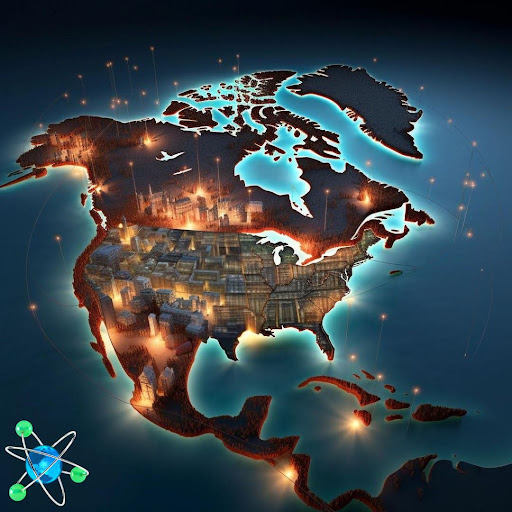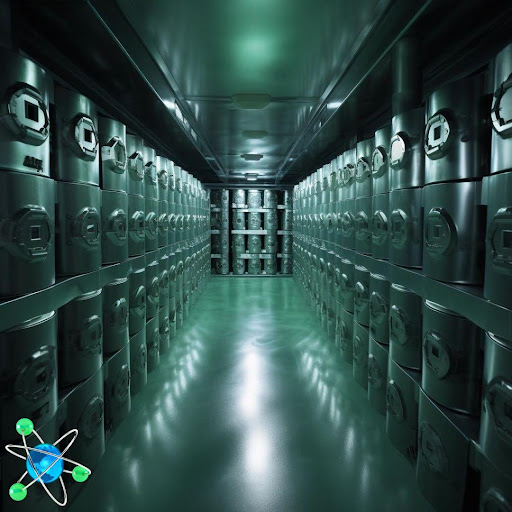
- Advanced Reactor Evolution: Transition from Low-Enriched Uranium (LEU) to High-Assay Low-Enriched Uranium (HALEU) fuels advanced reactor technologies, promising smaller, more efficient designs with increased power output.
- Strategic National Investment: The US Department of Energy (DOE) invests in domestic HALEU production, awarding contracts with a maximum value of USD500 million, aligning with President Biden’s climate agenda to achieve 100% clean electricity by 2035.
- Global Momentum for Clean Nuclear Energy: International collaboration among the USA, Canada, France, Japan, and the UK reflects a collective investment of USD4.2 billion, emphasizing the global commitment to developing safe and secure nuclear energy supply chains for a sustainable future.
The current US commercial nuclear fuel cycle is based on reactor fuel that is enriched to no more than 5% U-235 (known as low-enriched uranium, LEU). Some of the advanced reactor technologies that are currently under development use HALEU fuel – enriched to between 5% and 20% U-235 – which enables the design of smaller reactors that produce more power with less fuel than the current fleet, as well as systems that can be optimized for longer core life, increased safety margins, and other increased efficiencies. At present, only Russia and China have the infrastructure to produce HALEU at scale.
DOE’s Office of Nuclear Energy plans to award one or more contracts to produce HALEU from domestic uranium enrichment capabilities. Once enriched, the HALEU material will be stored on site until there is a need to ship it to de-converters.
Under the HALEU enrichment contracts – which have a maximum duration of 10 years – the government assures each contractor a minimum order value of USD 2 million, to be fulfilled over the term of the contract. Enrichment and storage activities must occur in continental USA and comply with the National Environmental Policy Act. Proposals are due by 8 March.
This RFP incorporated industry feedback received on a draft version issued in June last year.
In total, President Biden’s Inflation Reduction Act will provide up to USD 500 million for HALEU enrichment contracts selected through this RFP and a separate one, released in November, for services to de-convert the uranium enriched through this RFP into metal, oxide, and other forms to be used as fuel for advanced reactors.
“Nuclear energy currently provides almost half of the nation’s carbon-free power, and it will continue to play a significant part in transitioning to a clean energy future,” said US Secretary of Energy Jennifer Granholm. “President Biden’s Investing in America is strengthening our national and energy security through the domestic buildup of a robust HALEU supply chain, helping bring advanced reactors online in time to combat the climate crisis.”
“The Biden-Harris Administration knows that nuclear energy is essential to accelerating America’s clean energy future,” added Assistant to the President and National Climate Advisor Ali Zaidi. “Boosting our domestic uranium supply won’t just advance President Biden’s historic climate agenda, but also increase America’s energy security, create good-paying union jobs, and strengthen our economic competitiveness.”
DOE projects that more than 40 tones of HALEU could be needed before the end of the decade, with additional amounts required each year, to deploy a new fleet of advanced reactors in order to reach the current US Administration’s goal of 100% clean electricity by 2035 and net-zero emissions by 2050.
DOE is supporting several activities to expand the HALEU supply chain for advanced commercial reactors, including recycling used nuclear fuel from government-owned research reactors. In November, DOE reached a key milestone under its HALEU Demonstration project when Centrus Energy produced the country’s first 20 kilograms of HALEU.
Together, the USA, Canada, France, Japan and the UK have announced collective plans to mobilize USD 4.2 billion in government-led spending to develop safe and secure nuclear energy supply chains.
Earlier this week, the UK government announced it will invest GBP 300 million (USD381 million) to launch a HALEU program, making it the first country in Europe to launch such a nuclear fuel program.
In September, Orano revealed plans to extend enrichment capacity at its Georges Besse II (GB-II) uranium enrichment plant in France, and said it had begun the regulatory process to produce HALEU there.

